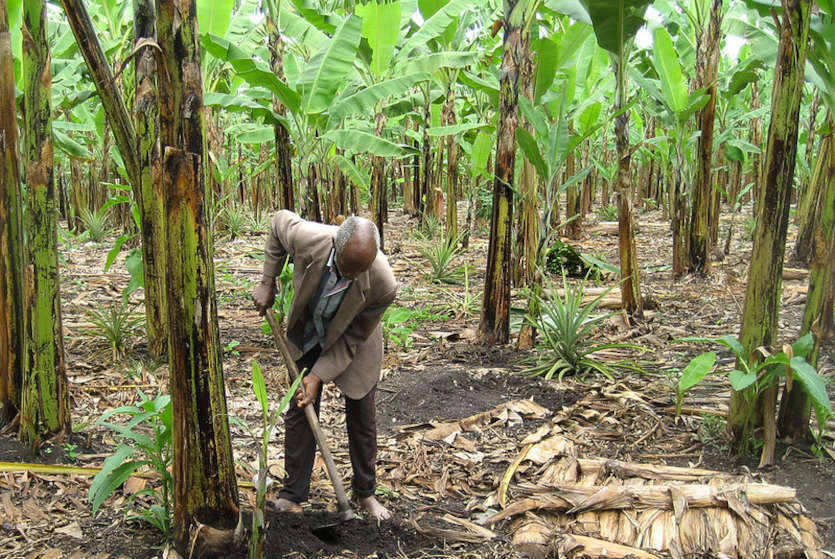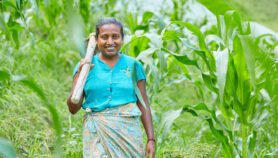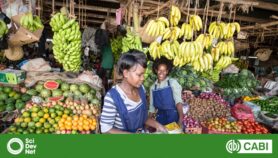21/11/23
Science hub to drive global climate resilience – UK PM
![sunak-food-security-summit Prime Minister Rishi Sunak's remarks at the Food Security Summit. [GOV.UK]: https://www.gov.uk/government/speeches/pms-remarks-at-the-food-security-summit-20-november-2023](https://www.scidev.net/global/wp-content/uploads/sunak-food-security-summit-960x567.jpg)
By: Ruth Douglas
Send to a friend
The details you provide on this page will not be used to send unsolicited email, and will not be sold to a 3rd party. See privacy policy.
[LONDON] A new UK-based science and innovation hub led by global agricultural research organisations will drive advances in climate-resilient crops to help tackle the world’s food crisis, British Prime Minister Rishi Sunak told a summit in London.
Less than seven years ahead of the UN’s 2030 goal of ending hunger and malnutrition, more than 258 million people are at imminent risk of starvation, according to the World Food Programme.
Droughts and floods caused by climate change, along with conflicts such as the Russia-Ukraine war, are fuelling the crisis, which is most severely affecting children, the Global Food Security Summit heard Monday (20 November).
“It can’t be right that today in 2023, almost one billion people across the world regularly do not have enough to eat, that millions face hunger and starvation, and over 45 million children under five are suffering acute malnutrition,” Sunak told the one-day conference.
“We cannot afford to have children dying from malnutrition, we cannot afford to have farmers who lose all their harvests because they have not planted the right seeds.”
Lindiwe Sibanda, chair of the CGIAR System Board
“In a world of abundance, no one should die from lack of food, and no parent should ever have to watch their child starve.”
He said the virtual centre would drive research into new crop varieties such as flood-tolerant rice and disease-resistant wheat.
The UK-CGIAR Centre for Collaboration and Innovation in Science and Technology will forge new collaborations between CGIAR, UK science institutes, and research centres in the global South, according to CGIAR, a global partnership that brings together international organisations engaged in food security research.
In a statement, CGIAR said the centre had already commissioned research and started building partnerships to work on sustainable crop management and climate-smart agronomic practices, crop genetic improvement, nutrition, and livestock and animal health.
The day-to-day running of the centre will be managed by the agricultural research organisation CABI (the parent organisation of SciDev.Net).
The British prime minister also launched the UK’s new white paper on international development, which emphasises the importance of science and innovation in addressing extreme poverty and climate change. It commits to investing more than half the UK’s bilateral aid to least developed countries.
The prime minister announced funding of up to £100 million (US$125 million) for those worst hit by the climate crisis, including in Sub-Saharan Africa and Afghanistan, as well as US$125 million to help Somalia manage water supplies and increase agricultural resilience to droughts and floods.
‘Sitting on gold’
Lindiwe Majele Sibanda, chair of the CGIAR’s high-level governing System Board, said the initiative would enable CGIAR to scale up the work it was already doing with UK scientists.
Gene banks, data banks and artificial intelligence (AI) should all be harnessed to “fight the big monster that is facing our farmers” and make farming climate smart, she told a panel discussion on science and technology at the summit.
CGIAR’s gene banks contain 700,000 samples, including beans, cowpeas, and cassava, which could be used to breed climate-smart, nutrient-dense seeds, she added.
“We are already sitting on gold, let’s actualise it,” she urged.
Pointing to the need for investment in new technologies for farmers, she highlighted the AI app Tumaini which she said had been a “game-changer” in helping banana farmers fight crop pests and diseases.

A farmer tending his banana plantation in Uganda. Innovations are extremely critical to ensure farmers survive what is coming their way, says Rwandan agricultural scientist Agnes Kalibata. Image credit: TAO (CC BY-NC-ND 2.0 DEED)
“With AI on the block, we can go back to all that data and fast-track our research to answer the most relevant questions of today,” Sibanda added.
“We cannot afford to have children dying from malnutrition,” she told the summit, which also focused on child wasting and stunting.
“We cannot afford to have farmers who lose all their harvests because they have not planted the right seeds.”
Rwandan agricultural scientist Agnes Kalibata, president of the Alliance for a Green Revolution in Africa (AGRA), said 200 plus varieties of drought tolerant crops including maize, cowpeas, and rice were already available.
She said these kinds of innovations were “extremely critical to ensure that farmers survive what is coming their way”.
But global institutions, including multilateral development banks, need to work together to scale up the solutions and get them to farmers, Kalibata told the summit.
With partnerships, innovation and technology, we are capable of feeding all the people on our planet.
That’s what today’s Global Food Security Summit was all about. It can be done.#GFSS23 #ZeroHunger #SDG2 pic.twitter.com/kXzKyFiQk1
— Foreign, Commonwealth & Development Office (@FCDOGovUK) November 20, 2023
Fighting pests
As well as causing extreme weather events such as droughts and floods, which threaten crop production around the world, climate change has given rise to an increase in crop pests and diseases.
Commenting at the event, CABI CEO Daniel Elger said: “Today over 40 per cent of crops are lost to pests and diseases and most of the burden of that falls on the 500 million or so smallholder farmers who produce at least a third of global food.” *
Solutions to this problem developed by CABI and partners, said Elger, include biopesticides to tackle pests like locusts, plant clinics to offer advice to farmers on plant health, and tools to predict and prepare for plant threats.
COP28
The summit, supported by the Children’s Investment Fund Foundation and the Bill & Melinda Gates Foundation, came just ten days ahead of the start of COP28, hosted by the United Arab Emirates (UAE).
Mariam Almheiri, the UAE’s minister of climate change and environment, announced that the UN climate conference in Dubai will kick off with a high-level session on food and climate on the first day (30 November).
Andrew Mitchell, the UK’s minister for development and Africa, joined Almheiri in urging countries to endorse the newly agreed Emirates declaration on sustainable agriculture, resilient food systems and climate change action.
Almheiri said the declaration, finalised after negotiations with more than 100 countries, set out a vision for action in five areas – adaptation, food security and nutrition, livelihoods, food and water systems integration, and more sustainable approaches to production and consumption.
“Our focus will be really to highlight the solutions and opportunities presented by food systems and their interactions with our precious planet,” she said.
“We need to identify these, scale them up and – of course – ensure that we are able to empower these solutions that we have.”
This piece was produced by SciDev.Net’s Global desk.
* This article was amended on 22 November, 2023 to correct billions to millions.













